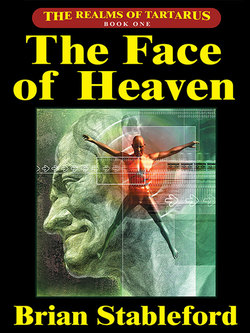Читать книгу The Face of Heaven - Brian Stableford - Страница 6
На сайте Литреса книга снята с продажи.
ОглавлениеChapter 2
The stars stood still in the sky. Pearl-white light. Every star perfectly round, no matter how close his imagination soared, no matter how far it crept, huddling into the mud and the foul earth. Always the same stars. Always still-standing, white-shining. Always.
Carl Magner, sweating in his sleep, dreaming a dream which, for him, was filled with horror and mystery, had no possible idea of what those stars might signify, and why. He only knew that they seemed to be perpetually falling upon him, threatening him and taunting him with a cold, steely anger.
Magner liked stars. Real stars. Stars which shone weakly, pin-point stars which wheeled their way slowly across the night sky and faded in the west when dawn came. He felt an attraction to those stars. They meant something to him—something real and safe and ultimately knowable if, for the time being, unknown.
But while the stars wheeled Magner slept, and his sleep took him into the world of alien stars which acted as stars should not.
They were the stars of Hell.
Carl Magner had no real understanding of his nightmares. There was no one who could help him to understand. Nightmares no longer existed as signs and symptoms and real phenomena. No one—except Carl Magner—had nightmares. The word was a label that had become a lie. There were no nightmares, supposedly. Carl Magner was alone. There was no one to help him, no help to be offered.
In fleeing the fall of the stars, Magner kept company with all manner of strange creatures—creatures whose names were also lie-labels, but whose being might once have been real, or at least hypothetical. He could name them—most of them—but he could not understand them. He had no preconceived attitude appropriate to them, nor any chain of logic which might help him decide.
They were the creatures of Hell. True Hell. Real Hell.
Not Dante’s Inferno, but Euchronia’s Tartarus. The Underworld. The world beneath the bowels of the Earth.
Knowing as he did that Hell was real, and knowing that there was no conceivable doubt of that fact, Carl Magner had little alternative but to accept the revelations of his dreams as realities. Because dreams were extinct, the unreality of dreams was by no means axiomatic. It did not even seem probable to Carl Magner. He looked upon the experiences of his sleep as an extra sense—an ultra-sight. There was no other way he could think of them.
Given that Hell was real, given that the nightmare experience was real, Carl Magner had no alternative but to think that the urgency of the dream, the madness of the dream, the fierceness of the dream, and the fearfulness of the dream were meaningful. The feelings of fear and compulsion were purposeful. Magner thought—and what else could he think?—that the dreams were not only trying to tell him something, but trying to make him act on it. He alone, of the millions of men who inhabited Euchronia’s Millennium, was prey to this compulsion, this fear, this need.
There was something messianic in the very fact of his perennial nightmare.
In Magner’s dreams, the Underworld was filled—positively filled, or it seemed so—with people. People living under the stars, trapped forever under the cold light of the alien stars. It was their terror which Magner felt, or so he thought. It was their compulsion.
He hardly sensed the people as individuals at all. He was aware of them en masse, as a unit, as a gargantuan hive organism, perpetually growing, and dying by degrees. But it was essentially human. He sensed the people of the Underworld as a whole race, but it was definitely a human race. Magner could identify with those people—he was identified with them. In his sympathy, he identified his fear with their fear, his nightmare with their nightmare.
Magner, in his sleep, was enmeshed in a gruesome, glue-some phantasmagoria of images which forced him to react. He could not exempt himself from the sensations of feet in sticky earth, lungs filling with dead, fetid air, gullets sucking up filthy water, any more than he could exempt himself from the terror. In his dreams, he was never clean, because excrement of all kinds was always close to him. He sweated constantly. It was hot, and worse than humid. It was glutinous.
Often in his dreams he found himself running—from the falling, staring stars, from the fluttering, screaming (?), nightflying moths, from the multicolored, shinyskinned, click-clicking crabs. But the running was so slow, his limbs so gummed down, his environs so thick and turgid, that he never got anywhere at all. The creatures of the eternal night kept coming. Eternally.
They never caught him, save by degrees.
The worst thing of all—absolutely the worst—was the fact that he passed so easily from the Hell-world of his nightmare to the real world of his waking life. The one faded into the other with a casual smoothness like the changing of images in a holoreceiver. The world of his inner, secret life and the world in which he lived as one of the infinitely privileged of Euchronia’s Millennium were not merely close. They overlapped.
At best, they touched. At worst, they were one and the same Earth.
Carl Magner believed, deeply and sincerely—and what else could he believe?—that his nightmare was a message and a command. He believed that the people of the Underworld were asking...demanding...his help.
